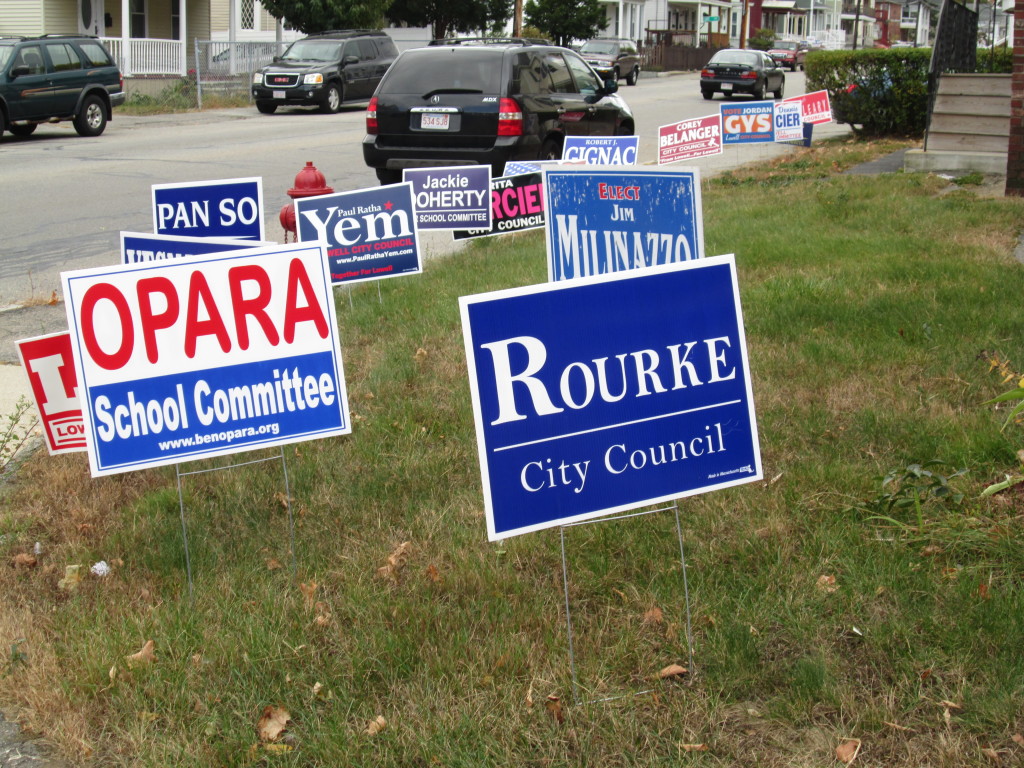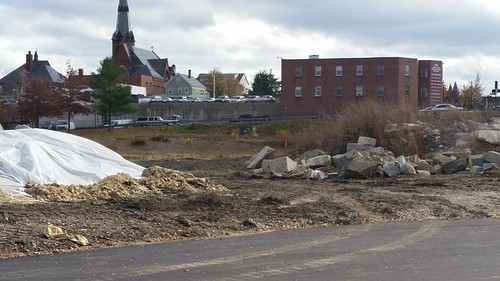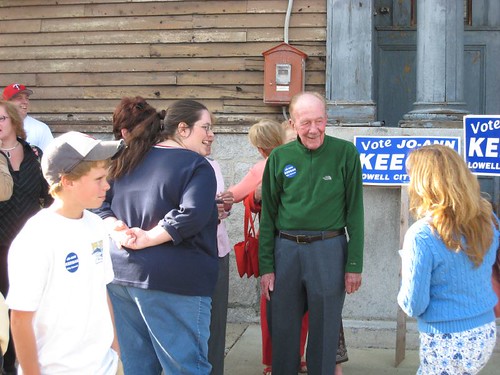Lowell Week in Review: November 8, 2015

City Election
Voters opted to stay the course on Tuesday, reelecting all incumbents on the ballot including eight city councilors and two school committee members. Even those elected already had connections with city government: Jim Leary, the new city councilor, was an incumbent school committee member; three of the four new school committee members, Jackie Doherty, Bob Gignac, and Bob Hoey, had previously served on the school committee; and the fourth new member, Andy Descoteaux, recently retired as a teacher in the Lowell public schools. I’ve shared some observations about the election in some previous posts:
2015 Lowell Election Results (Tues, Nov 3)
Rapid Reaction to 2015 City Election (Wed, Nov 4)
2015 Lowell Election: Turnout by Precinct (Thur, Nov 5)
Lowell Election by the Numbers (today)
Charter Change
The week after a city election often brings talk of a charter change and this year is no different. Well, that’s not quite right. Usually such talk comes from supporters of losing candidates. This year, it comes from Mayor Rodney Elliott who finished second in Tuesday’s election. Elliott has filed a motion for Tuesday’s council meeting in which he asks that the “City Council begin discussion of a Charter change regarding the number of candidates required to have a preliminary election.”
Whether or not this is a good idea, now is definitely the time to begin such a discussion. Usually the council waits until the next election’s nomination papers are already out to revive this perennial issue. Several times in the past, our state legislators rushed through home rule legislation to cancel the city preliminary when there was only 19 or 20 candidates (any more than 18 require a preliminary per the existing charter), but after the last time that happened, then state senator Steve Panagiotakos emphatically said not to do it again and councilors have heeded that admonition.
So what is the appropriate number of candidates needed to justify a preliminary? Is it 20? Is it 24? It’s probably wise to increase it from 18 because we either get fewer that amount anyway or just one or two more. Holding a preliminary election to eliminate just one or two candidates seems like quite a waste of money and effort. The problem I foresee is that no matter what you set as the tripwire for a preliminary, any time you have just one more candidate than that number, you will revisit the same complaints we had this year.
Although this motion is directed specifically at the number of candidates to trigger a preliminary election, other discussions of the city’s charter previously held have advocated changing from a system where all councilors are elected at large to one where some are elected at large and others are elected to represent neighborhood districts. Lowell used to have such a system but ended it, I think in the 1950s. My dad used to tell me that when all the councilors were elected by district, their interests were so focused on the competition for scarce resources for their own districts that issues of citywide importance were often neglected.
Other past ideas for charter change have included proportional representation (the system used in Cambridge); having an enlarged council assume responsibility for the schools with the school committee eliminated; and changing to a strong mayor form of government.
These proposals tend to fail because their passage depends to a great extent on winning the support of current elected officials, the media that covers those elected officials, and the relatively small number of city residents who elect those officials. Since any change is a threat to the power and influence of all three of those groups, they are unlikely to be sincere in their support of fundamental changes to the charter.
Mayor Elliott’s motion would make only a slight change to the system and is fiscally prudent so it will probably be received favorably.
Judicial Center News
At Wednesday’s press conference, Governor Baker announced the release of $14mil in state funds to “relocate utilities” and to continue the planning process for the new Lowell Judicial Center. A six-week spurt of activity this fall has extended Jackson Street up to Dutton with a big turnaround circle at the end. This new roadway is necessary to provide construction vehicles access to the site where the Judicial Center will be constructed. The Governor did not state a specific date when construction of the new building will begin, mentioning only that it will start “sometime next year.” It’s my understanding that from ground breaking to occupancy will take about 30 months, so if work begins in June 2016, the building would open in January 2019.

Artists rendering of Lowell Judicial Center (Lord Overpass in background)

Current appearance of Judicial Center site
American Textile History Museum
Wednesday brought news that the American Textile History Museum which has been located on Dutton Street since moving to Lowell from Andover in 1997 will close its exhibit space to the public on January 1, 2016. The stated reason for this action is that even with aggressive fundraising and deep budget cuts, the current revenue stream of the museum was inadequate to maintain the current model of operations.
This is not the first closure for this museum. Back in 2005, I believe, it closed its exhibits to the public, permanently closed its Textile Conservation Center, sold a portion of its Dutton Street building (now residential condominiums), and launched a major fund raising effort.
This time is different. It seems not to be a restructuring but an effort to bring more fundamental change such as a merger with another institution or perhaps even a takeover by some other entity. The top priority of the ATHM is not to reopen as a public exhibition space, but to preserve its priceless collection of historic textile industry artifacts.
I will be surprised if when ATHM emerges from this episode that it will still reside on Dutton Street or even in Lowell. The perfect landing place for the ATHM would be Lowell National Historical Park but that would require some level of high-level and fast Federal decision making, something I find unlikely to happen in today’s public policy climate.
Not being privy to all the particulars of the museum’s current distress, I can’t say for sure how much its isolated location on Dutton Street contributed to its difficulties, but I have to think that had something to do with it. It’s hard enough to get historical tourists to come to Lowell without putting obstacles to access in their way once they arrive.
I’ve written and spoken at length about that entire Dutton Street corridor as being one big obstacle to access. Those who feel similarly should plan to attend the public meeting the city his holding about the Lord Overpass and vicinity. The meeting is Monday, November 16, 2015 at 6 pm at the Lowell Senior Center at Broadway and Fletcher.

Joe Tully in May 2007 at his daughter Jo-Ann Keegan’s Lowell City Council candidacy announcement
The Passing of Joe Tully
Former City Manager Joe Tully passed away this week. Back in 1972 when I was just barely in my teens, Joe Tully was the state senator representing Lowell and Dracut. My dad (Richard P. Howe Sr.) chose to challenge him in the Democratic Primary that year. It was a brutal campaign that Tully ended up winning by a considerable margin.
The mutual animosity from that campaign resumed when Tully was chosen to be City Manager of Lowell in 1979, a position he held until 1987. My dad was on the city council throughout that period and was Tully’s harshest critic. Their battles were epic and constant, verbally waged one-on-one on the floor of the council chamber each Tuesday night. Tully won most of the votes, usually by an 8 to 1 tally, but that was also the time during which my dad topped the ticket in council races “with all the predictability of the tides” as the Lowell Sun once reported.
My own contacts with Joe Tully came long after that. In the early 2000s, his grandchildren were students at the Daley School at the same time my son went there. Occasionally I would pick Andrew up after school and Joe would always be there, waiting to pick up his grandkids. We would chat cordially, but only obliquely about past council battles. At about that same time, my dad seemed to grow nostalgic about their past battles, commenting often that if council meetings had been televised back then, they would have been the highest rated shows on TV.
It is worth noting that added to all of their past connections, the Dick Howe and Joe Tully were joined once again by the proximity of their passing.

Program from LHS Theater Group
Live Theater in Lowell
Growing up, my exposure to live theater was limited to attending a few city council meetings (which, as I mention above, were pretty entertaining) so I was late in gaining an appreciation of the stage. I was fortunate this past week to see two excellent performances right here. Friday night I caught the Lowell High School drama club’s excellent rendition of “You Can’t Take it With You” in the Freshmen Academy’s Burgoyne Theater. Last Sunday, I saw the final performance at the MRT of “I and You” before it heads off to New York City. Each of these shows was great in its own way and both made me want to see more live theater, especially when it can be done within 10 minutes of my home. The LHS troupe has yet to schedule its next performance, but the MRT begins its new show, “It’s a Wonderful Life” on November 25, 2015. Please check it out.
Dave Faneuf
The Mayor is proposing a single change to the charter, but once the charter is opened for review couldn’t other changes be proposed as well Or is it limited to the single change the mayor is suggesting?